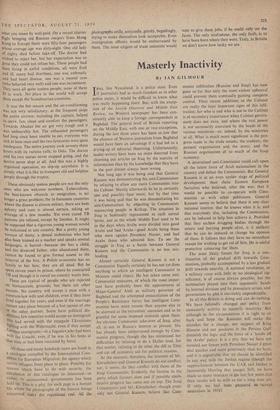Masterly Inactivity
By IAN GILMOUR IRAQ, like Nyasaland, is a police state. Even if journalists had as much freedom as in other police states, it would be difficult to know what was really happening there. But, with the excep- tion of the Jewish Observer and Middle East Review, no Western 'newspaper has been con- sistently able to keep a foreign correspondent in Baghdad. The general level of British reporting on the Middle East, with one ,or two exceptions, during the last three years has been so low that the absence of Western journalists from Baghdad would have been an advantage if it had led to a drying-up of editorial theorising. Unfortunately, leader-writers have been no more deterred from churning out articles on Iraq by the scarcity of information than by the knowledge that they have in the past almost always been wrong.
Not long ago it was being said that General Kassem was demonstrating his anti-Communism by refusing to allow any more Communists into his Cabinet. Shortly afterwards he let in certainly one and possibly four more; but by that time it was being said that he was demonstrating his anti-Communism by objecting to Communists massacring people in Kirkup. The situation in Iraq is habitually represented in such unreal terms, just as the whole Middle East used to be in the days when Arabs were divided into good Arabs and bad Arabs—good Arabs being those who were against President Nasser, and bad Arabs those who admired him. To see' the struggle in Iraq as a battle between General Kassem and the Communists is no less mis- leading.
Almost certainly General Kassem is not a Communist. Equally certainly he has not yet done anything to which an intelligent Communist in Moscow could object. He has taken some anti- Communist measures, of which the most impor- tant have probably been the appointment of Major-General Abdi as military governor of Baghdad.and the attempted emasculation of the People's Resistance force; but intelligent Com- munists have more reason than anyone else to be alarmed at the extremists' successes and to be grateful for some imposed restraint upon them. An obvious Communist take-over of Iraq, after all, is not in Russia's interest at present. She has already been embarrassed enough by Com- munist progress, though she has minimised her difficulties by refusing to do a Dulles (and, for that matter, refusing to do what she did to Tito) and cut off economic aid for political reasons.
At the moment, therefore, the interests of Mr. Khrushchev and General Kassem do not conflict; nor, it seems, do they conflict with those of the Iraqi Communists. Evidently the faction in the party which favours slow and if possible unob- trusive progress has come out on top. The Iraqi Communists and Mr. Khrushchev, though prob- ably not General Kassem, believe that Corn- munist infiltration (Russian and Iraqi) has now gone so far that only the most violent upheaval could prevent them eventually gaining complete control. Their 'recent additions to the Cabinet are really the least important signs of this infil- tration; for who is and who is not in the Cabinet is of secondary importance when Cabinet govern- ment does not exist, and where the real power is not necessarily exercised by the heads of the various ministries—or, indeed, by the ministries at all. What is much more significant is the pro- gress made in the trade unions, the students, the peasant organisation and the army; and the Russian organisation of so much of the Iraqi economy.
A determined anti-Communist could call upon all the latent force of Arab nationalism in the country and defeat the Communists. But General Kassem is at an even earlier stage of political development than those Eastern European Socialists who believed, after the war, that it would be possible to co-operate with Com- munists as with other politicians. General Kassem seems to believe that there is one clear national interest; that he knows what it is; and that everybody else, including the Communists, can be induced to help him achieve it. Provided that they eschew dragging bodies through the streets and burying people alive, it is unlikely that he can be induced to change his opinion of them. It follows that they have no immediate reason for wishing to get rid of him. He is useful protective colouring for them.
The most likely future for Iraq is a con- tinuation of the gradual drift towards Com- munism, probably accompanied by a less gradual drift towards anarchy. A national revolution, or a military coup with little or no ideological sig- nificance, is of course always possible; but the nationalists played into their opponents' hands by internal division and by premature action, and government by plot is inevitably unpredictable.
In all this Britain is doing and can do nothing. We have belatedly changed our policy from unmasterly activity to masterly inactivity. But although in the circumstances it is right to sit back and hope the Russians will make the mistakes for -a change, our support of King Hussein and our positions in the Persian Gulf diminish the logic and the force of a 'hands off the Arabs' policy. It is a pity that we have not mended our fences with President Nasser a great deal quicker and more generously than we have, and it is regrettable that we should be identified in any way with the Jordan regime (though the rapprochement between the UAR and Jordan is fortunately blurring that image). Still, we have made so many mistakes in the last few years that their results will be -with us for a long time yet. If only we had been prepared to accept neutralism in 19551


































 Previous page
Previous page